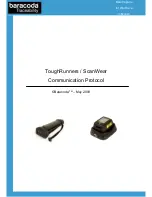
1-14
Catalyst 3750-E and 3560-E Switch Software Configuration Guide
OL-9775-08
Chapter 1 Overview
Features
Layer 3 Features
Note
Some features noted are available only in the IP services feature set.
•
HSRP Version 1 (HSRPv1) and HSRP Version 2 (HSRPv2) for Layer 3 router redundancy
•
IP routing protocols for load balancing and for constructing scalable, routed backbones:
–
RIP Versions 1 and 2
–
HSRP for IPv6 (requires the IP services feature set)
–
Full OSPF (requires the IP services feature set)
Starting with Cisco IOS Release 12.2(55)SE, the IP base feature set supports OSPF for routed
access to enable customers to extend Layer 3 routing capabilities to the access or wiring closet.
–
Enhanced IGRP (EIGRP) (requires the IP services feature set)
–
Border Gateway Protocol (BGP) Version 4 (requires the IP services feature set)
•
IP routing between VLANs (inter-VLAN routing) for full Layer 3 routing between two or more
VLANs, allowing each VLAN to maintain its own autonomous data-link domain
•
Policy-based routing (PBR) for configuring defined policies for traffic flows
•
Multiple VPN routing/forwarding (multi-VRF) instances in customer edge devices to allow service
providers to support multiple virtual private networks (VPNs) and overlap IP addresses between
VPNs (requires the IP services feature set)
•
VRF Lite for configuring multiple private routing domains for network virtualization and virtual
private multicast networks
•
Support for these IP services, making them VRF aware so that they can operate on multiple routing
instances:
HSRP, uRPF, ARP, SNMP, IP SLA, TFTP, FTP, syslog, traceroute, and ping
•
Fallback bridging for forwarding non-IP traffic between two or more VLANs (requires the IP
services feature set)
•
Static IP routing for manually building a routing table of network path information
•
Equal-cost routing for load-balancing and redundancy
•
Internet Control Message Protocol (ICMP) and ICMP Router Discovery Protocol (IRDP) for using
router advertisement and router solicitation messages to discover the addresses of routers on directly
attached subnets
•
Protocol-Independent Multicast (PIM) for multicast routing within the network, allowing for
devices in the network to receive the multicast feed requested and for switches not participating in
the multicast to be pruned. Includes support for PIM sparse mode (PIM-SM), PIM dense mode
(PIM-DM), and PIM sparse-dense mode (requires the IP services feature set)
•
Support for the SSM PIM protocol to optimize multicast applications, such as video
•
Multicast Source Discovery Protocol (MSDP) for connecting multiple PIM-SM domains (requires
the IP services feature set)
•
Distance Vector Multicast Routing Protocol (DVMRP) tunneling for interconnecting two
multicast-enabled networks across nonmulticast networks (requires the IP services feature set)
•
DHCP relay for forwarding UDP broadcasts, including IP address requests, from DHCP clients
•
DHCP for IPv6 relay, client, server address assignment and prefix delegation
Summary of Contents for Catalyst 3750-E Series
Page 48: ...Contents xlviii Catalyst 3750 E and 3560 E Switch Software Configuration Guide OL 9775 08 ...
Page 52: ...lii Catalyst 3750 E and 3560 E Switch Software Configuration Guide OL 9775 08 Preface ...
Page 1414: ...Index IN 58 Catalyst 3750 E and 3560 E Switch Software Configuration Guide OL 9775 08 ...
















































